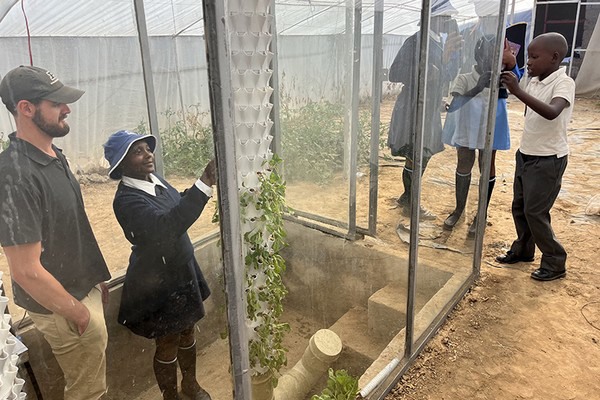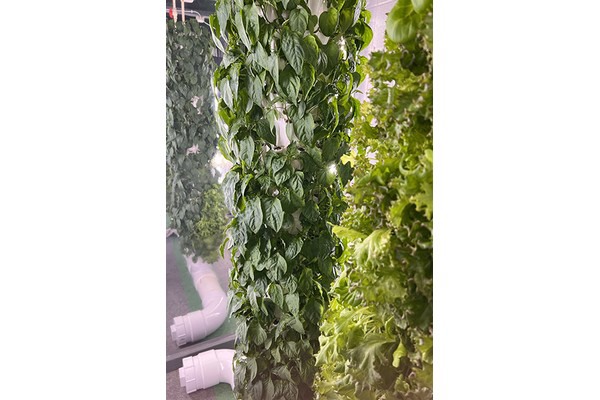In agricultural startup founded by Purdue University alumni is addressing international food insecurity in the Kingdom of Lesotho and rural southern Indiana, with a goal to expand domestically and internationally.
Heliponix LLC, doing business as anu™, commercializes fully automated, in-home smart gardens that grow daily servings of produce using aeroponics. Aeroponics is a form of hydroponics, the technique of growing plants without soil.
The anu smart gardens consume less energy and more than 98% less water than conventional field farming. Produce includes most leafy green vegetables, culinary herbs, and fruiting and flowering plants, which Anu manufactures in seedpods.
Purdue Polytechnic Institute alumni Scott Massey and Ivan Ball founded anu, inspired by working on NASA-funded hydroponic research at Purdue led by Cary Mitchell, professor of horticulture in the College of Agriculture. Purdue Innovates has invested in anu, and the Indiana Economic Development Corp. awarded the company an Indiana Manufacturing Readiness Grant in 2023.
Anu in Lesotho
According to the World Food Programme, Lesotho has a population of 2 million. More than 24% of the population lives in extreme poverty, and around 580,000 people face food insecurity.
In summer 2017, Massey met Fellows from the U.S. Department of State's Mandela Washington Fellowship, who spent six weeks at Purdue for a Leadership in Business Institute. During their Institute, Fellows had the opportunity to learn about hydroponic farming. Massey participated in the fellowship's Reciprocal Exchange component to build the first hydroponic systems in Togo in 2018 and Cameroon in 2019. Reciprocal Exchanges strengthen mutual understanding between the U.S. and Africa and contribute to U.S. public diplomacy efforts. U.S. experts and leaders are encouraged to collaborate with Fellows on critical issues such as promoting peace, stability and economic prosperity.
 Ivan Ball, co-founder of anu, looks on as students in Lesotho grow vegetables using anu's fully automated smart gardens. which grow daily servings of produce using aeroponics.
Ivan Ball, co-founder of anu, looks on as students in Lesotho grow vegetables using anu's fully automated smart gardens. which grow daily servings of produce using aeroponics.
In 2022 Massey mentored Tiisetso Sefatsane, a Mandela Washington Fellow and Mosotho, or member of the Basotho people, during her Leadership in Business Institute at Purdue. Sefatsane returned to Lesotho with hardware to create a functional proof-of-concept system of anu's technology. It was solar-powered to achieve complete off-grid self-sufficiency.
"Having Scott as my mentor has been a true turning point for me and the community," Sefatsane said. "Scott not only assisted me on my business pitch, but he also gifted me a pair of grow-ring aeroponics systems. These have been used as proof-of-concept systems in the mountain kingdom to grow vegetables all year round so Basotho can learn climate-smart agriculture tools and techniques."
Sefatsane, Massey and Ball received a Reciprocal Exchange grant to increase the capacity of the systems from 250 to 750 plants at a time.
"Today, we host students from different backgrounds for capacity building by producing high yields on small spaces and saving water using environmentally friendly tools and techniques," Sefatsane said. "The anu system has proven its sustainability as we grow vegetables throughout the year, even in the winter season's harsh, cold weather conditions. The system also can be used in rural areas where there is no grid power because it can be solar-powered."
Massey said anu will continue its work with Sefatsane and her farm.
"We will maintain the growth of Tiisetso's farm and we look forward to expanding across the Kingdom of Lesotho and eventually the African continent in parallel to domestic U.S. growth," Massey said.
Anu in rural southern Indiana
Ray Niehaus is a former high school teacher and the director of Vincennes University's Center for Technology, Innovation and Manufacturing. He met Massey and Ball when they debuted their smart garden during an event at Purdue WestGate, an economic development accelerator formed by the partnership among WestGate Authority, Naval Surface Warfare Center Crane Division, Purdue University and Purdue Research Foundation.
Niehaus kept in touch with Massey after the event to find ways to involve his students in anu's future work. Niehaus and faculty at Perry Central High School in Leopold led their students' involvement to bring anu smart gardens to the area.
"My colleagues and I were really interested in the technology and vertical agriculture, along with the impact they could have on a rural community," Niehaus said. "We thought bringing anu's smart gardens to Perry Central would be a great experience for students to understand the future of agriculture and the importance of growing our own food."
 Smart gardens from anu use aeroponic technology to grow fruiting pepper plants at Perry Central High School in Leopold, Indiana. (Perry Central High School photo/Ray Niehaus)
Smart gardens from anu use aeroponic technology to grow fruiting pepper plants at Perry Central High School in Leopold, Indiana. (Perry Central High School photo/Ray Niehaus)
Niehaus said Massey and Ball shared their vision of the technology with Perry Central faculty and students.
"Partnering with anu was very valuable to our students and community," Niehaus said. "Scott and Ivan brought authentic experiences and future-oriented technology that will help our students prepare for the workforce they will be working in."
Perry Central students set up three grow towers and designed their own structure to contain them. They created a manual that specified the materials needed, explained how to assemble the towers and included a business plan for how to make the product sustainable for other high schools.
"The students gave presentations to elementary students about how to grow their own food," Niehaus said. "They also designed experiments to determine how much water it would take to run one tower with lettuce, how much lettuce they could harvest out of one pod, etc."
Perry Central leaders are working to redesign the school's greenhouse to include more vertical agriculture options.
"The goal is to produce food for our cafeteria and local food pantries," Niehaus said. "Also, they have worked to get our kitchen certified to process and sell food products in the lab. This will provide an opportunity for our students to not only gain valuable, authentic experiences but teach our community the benefits of vertical planting and self-sufficiency, impacting the world they live in."
International food scarcity and security
According to the Food and Agriculture Organization of the United Nations' State of Food Security and Nutrition in the World 2023 report:
- Around 9.2% of the world's population was affected by hunger in 2022, an increase from pre-pandemic levels of 7.9% in 2019.
- Since the outbreak of the COVID-19 pandemic, the number of people in Africa facing hunger has increased by more than 57 million people.
- 33.3% of adults living in rural areas were affected by moderate or severe food insecurity in 2022, compared to 26% of adults in urban areas and 28.8% in peri-urban areas. Peri-urban areas are zones where land use transitions from rural land use to urban land use.
- It is estimated that by 2030, nearly 600 million people around the world will be chronically undernourished.
Massey said conflicts such as shipping disruptions in the Red Sea and the Russia-Ukraine war pose serious risks to global food security.
"They disrupt food exports and key resources like natural gas, which is essential to produce the fertilizer that half the world's population depends on for food cultivation," Massey said.
Source: purdue.edu
